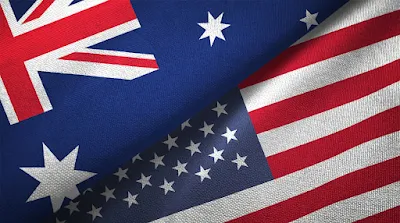The Trump administration’s recent actions—both domestic and international—have intensified global concern about the direction of U.S. leadership, with even key allies such as Australia beginning to assert a more independent foreign policy stance. In a notable departure, Australian Prime Minister Anthony Albanese recently declined to offer assurances that Australia would support the U.S. militarily in the event of a conflict with China over Taiwan—an unprecedented move reflecting growing unease with President Trump’s strategic posture.
This shift comes amid a turbulent period for the White House. Domestically, the administration faces mounting criticism for deploying masked paramilitary-style immigration enforcement squads, sparking protests across several states. Internationally, Trump's unwavering support for controversial regimes in Israel and Ukraine has drawn scrutiny, as has his recent decision to impose additional tariffs on the European Union and other long-standing allies—further disrupting the global economic order.
The situation was further exacerbated last week when reports emerged of Trump threatening to “bomb the sh*t out of Russia and China,” alongside the bizarre launch of a high-security detention center dubbed “Alligator Alcatraz” in Florida. These developments have reportedly unsettled even Trump’s most loyal base, many of whom feel betrayed by unfulfilled promises to end U.S. involvement in foreign conflicts and revitalize the economy.
Adding to public discontent, the administration’s refusal to release Jeffrey Epstein’s client list has fueled suspicions of political protectionism. Prominent Trump supporters have begun to express open frustration, and the President's dissatisfaction with cabinet figures like Pete Hegseth and Pam Bondi has become increasingly visible. Meanwhile, the prolonged silence of Vice President J.D. Vance has raised questions about internal cohesion within the administration.
Australia Shifts Away From Automatic Alignment
Albanese’s rebuff of Trump’s Taiwan request was striking, especially given his government’s previously unwavering alignment with U.S. foreign policy—supporting the Zelensky administration in Ukraine, endorsing U.S. positions on the Gaza conflict, and upholding the AUKUS security pact initiated under former Prime Minister Scott Morrison. His cautious endorsement of the AUKUS framework had, until now, been viewed as an effort to neutralize foreign policy as a partisan issue at home, while shielding his government from criticism by pro-Trump, pro-Israel media outlets, particularly the Murdoch-owned press.
Yet, Albanese’s latest diplomatic posture suggests that even longstanding allies are beginning to reconsider their strategic calculus. His recent visit to China—where he met with President Xi Jinping and received assurances of continued bilateral cooperation—marked a subtle but significant rebalancing of Australia’s foreign relations. Trump’s attempt to extract a military commitment during that visit appears to have been deliberately timed, yet ultimately unsuccessful, due to the high stakes involved.
Committing military support to a potential conflict with China would jeopardize Australia’s critical trade relationship with its largest economic partner. The contrast in diplomatic tone—Trump’s demands versus Xi’s affirmation of cooperation—underscored the increasingly complex environment in which middle powers like Australia must now operate.
Growing Disquiet Over Trump’s Foreign Policy Coherence
The broader concern for U.S. allies lies in the perceived unpredictability of the Trump administration’s foreign policy. Trump’s skepticism toward NATO, uncertainty surrounding commitments to regional allies, and suggestions that AUKUS may be subject to internal review all add to the prevailing unease. The AUKUS pact, involving a $360 billion investment in nuclear submarines, is now being reevaluated not only for its economic feasibility but also for its strategic implications.
From a military standpoint, Australia has no direct interest in defending Taiwan, and few believe that it, in tandem with the U.S., could prevail in a conflict with China in the Indo-Pacific. The premise, say observers, is strategically flawed and diplomatically hazardous.
Even as Trump promotes a reduced U.S. footprint abroad, his rhetoric and actions continue to assert American primacy—often through unilateral or confrontational means. This contradiction has only served to embolden rival blocs, with China, Russia, and other BRICS nations deepening their diplomatic and strategic alignments in response.
Domestic Fallout and Media Dynamics
Back home, Trump’s administration faces growing backlash for its suppression of dissent, including the defunding of public broadcasters and reported efforts to pressure media outlets critical of his policies. Recent scenes of ICE officers clashing with protestors—particularly the manhandling of Senator Alex Padilla during a press briefing—have reignited concerns over civil liberties and democratic norms.
The optics of such events resonate internationally, influencing perceptions of U.S. governance and soft power. Albanese’s own election was buoyed, in part, by public fatigue with aggressive political rhetoric—a sentiment shared by voters across Western democracies increasingly wary of Trump-style governance.
Recalibrating Alliances in a Shifting Global Order
Two key takeaways emerge from Albanese’s recent diplomatic posture and Trump’s treatment of longstanding allies:
-
The Trump administration’s foreign policy is becoming increasingly erratic, undermining the predictability that traditional allies have come to rely upon.
-
Strategic partners such as Australia are beginning to assert greater independence, wary of being drawn into conflicts that do not serve their national interests.
As global power dynamics continue to evolve, Western leaders may find themselves forced to choose between maintaining historic alignments or pursuing sovereign foreign policy decisions that better reflect their national priorities. Failure to adapt may leave them exposed—politically and economically—as evidenced by the diminishing influence of figures like Ukrainian President Volodymyr Zelensky, once a key Trump ally.
In a world where multipolarity is increasingly the norm, the need for nuanced diplomacy and strategic restraint has never been greater.




.png)
The opinions posted here do not belong to 🔰www.indiansdaily.com. The author is solely responsible for the opinions.
As per the IT policy of the Central Government, insults against an individual, community, religion or country, defamatory and inflammatory remarks, obscene and vulgar language are punishable offenses. Legal action will be taken for such expressions of opinion.